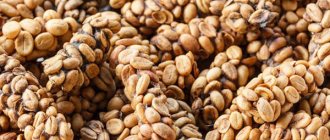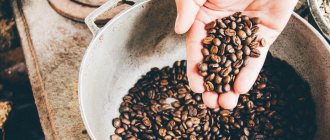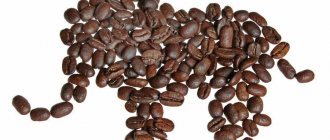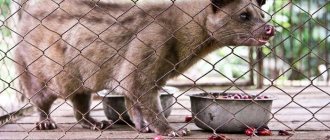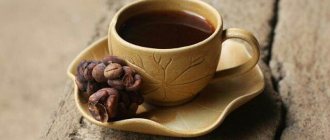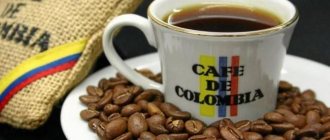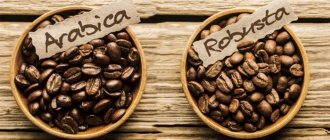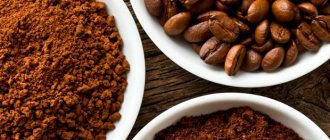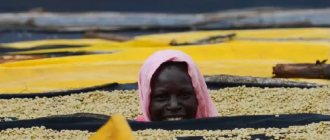The special taste of kopi luwak and its characteristics
The most expensive type of coffee is obtained by passing the beans through the digestive tract of the palm civet, also called musang or luwak. After the coffee fruit (cherry) enters the animal’s body, the pulp is digested. Digestive fluids have little effect on grains. The product used in production leaves the body along with feces.
Coffee made from animal feces has a chocolate or caramel flavor. The bitterness of the drink is given by civet, a special enzyme secreted by the glands of the anus of the musang. Kopi luwak coffee gets its special taste thanks to the enzymes found in the civet’s stomach.
Such luwak can be prepared artificially. To do this, the grains are sprayed with civet obtained in the laboratory. Luwak coffee made from poop is faked by adding flavorings and flavorings. However, a connoisseur is able to identify a fake or artificially obtained drink. The taste of the product is influenced by coffee varieties, the best of which is Arabica.
Some information about coffee
Coffee trees are grown in different countries, mainly in the tropical climate zone. These trees belong to the madder family and number about 60 different species. The grains of this product contain a large number of chemicals. The main components are:
- caffeine, about 1-2%;
- ester of caffeic and quinic acid - 5-8%;
- 1% citric acid;
- 6% carbohydrates;
- 5% mineral salts.
The production of regular coffee differs in different methods of roasting (at different temperatures), adding impurities (which gives a particular flavor to the drink), or the type of coffee tree. The production of the most expensive varieties of black drink has a slightly different and interesting scheme. These production methods influence the cost of a valuable product. So, get acquainted with expensive coffee varieties and their production.
The most expensive varieties are obtained from animal excrement
Origin
The birthplace of the unusual type of Luwak coffee is Indonesia. Luwak is also produced in Vietnam. Musangs involved in the production process live in the wild or on special farms. Civets do not breed in captivity. For this reason, farm owners are forced to catch the animals. Musangs quickly become tame, but at night they can become aggressive.
To get 50 g of product, the civet must eat at least 1 kg of berries.
During the day, the animals most often sleep and practically do not eat. Feeding is carried out in the evening. The enzyme civet is produced in the body of musangs only 6 months a year. In order not to contain animals for the remaining time, farm owners release them into the wild.
The civet is a small animal. It cannot produce large quantities of coffee. Other animals can be used to produce the product on the farm: rabbits, elephants, porcupines, etc. However, the coffee obtained from them does not meet established standards due to the different composition of digestive fluids. For example, fruits fed to elephants do not receive the necessary enzyme treatment due to the animal's refusal to accept coffee in its pure form. Farm workers are forced to mix fruits into food in small quantities.
Interesting!
Anaerobic fermentation
Anaerobic fermentation occurs with the participation of water; most often it is this that is popular with manufacturers, since, unlike aerobic fermentation, it can be controlled. The berries are loaded into fermentation tanks filled with water for 72 hours. With anaerobic fermentation, you can adjust how the final taste of coffee will be: acidic or sweet, this is done by changing temperature parameters. If the temperature inside the tank is from 4-8°C, the taste of the drink will go into acidity, from 18-20°C, in this case the sweetness will be revealed more.
In this process, it is important to monitor the temperature inside the fermentation tank, sugar content, acidity of the water, and time. Indicators can be changed by analyzing and comparing with each other, which will help to achieve a better result.
At the moment, many experiments are being carried out with the addition of different bacteria and yeasts, and fermentation with carbon dioxide is also carried out, trying to achieve a better product. Fermentation plays a key role in shaping the flavor profile; successful fermentation can help high-quality Arabica beans achieve specialty class.
How coffee is made
The process of making the exotic drink Luwak, named after palm civets, includes several stages:
- Drying excrement. Feces are processed naturally, spread out on special sheets.
- Extraction. Farm employees extract coffee beans by hand. At the same stage, quality material is selected.
- Flushing. Selected grains are washed several times in water.
- Drying. The washed material is dried again in the open air.
- Roasting. Various varieties of Luwak have emerged through the use of several methods of roasting the beans. Each method gives the drink a special taste. The most common processing is using sweet syrup.
Varieties and cost
Coffee leftist is not the only one of its kind. Black Ivory is extracted and produced in a similar way. The difference is that fermentation occurs in the stomachs of Indian elephants. The cost of this coffee starts at $1,080 per kilogram. One small serving of coffee in restaurants costs $50.
Black Ivory is extracted and produced in a similar way.
The next similar exotic product is the Jacques Bird coffee variety. Made in Brazil. In this case, the grains undergo initial processing in the stomach of the birds. At the same time, Brazilian farms use an organic method of farming, that is, they do not lock birds in cages, but recreate conditions for them that are as close as possible to wild ones. Prices start at $430 per kilogram.
Another variety is Coffee Terra Nera. It is made using palm civets. The quantity of this coffee is limited. You can find it only in one place: in a coffee shop in London. The cost exceeds $1,500 per kilogram.
How to cook properly
There is a traditional way to brew the drink.
1-2 tsp. The ground product is poured into a metal glass, at the bottom of which there is a sieve. The glass is placed on another container and the product is poured with boiling water. The liquid seeps through a sieve into a container located under a metal vessel. The drink should be infused for at least 15-20 minutes before drinking.
In European countries, another brewing method has become widespread:
- The grain product is ground in a coffee grinder before use.
- Almost any container can be used for brewing. However, Kopi Luwak fans recommend using a silver-plated copper pot.
- Heat the container over low heat for 1-2 minutes.
- Pour 1 tsp into the prepared Turk and removed from the heat. product (for preparing 1 serving).
- The next step is to add salt at the tip of the knife. This ingredient will not affect the taste of the drink. Salt is needed to form and preserve the foam.
- Pour 1 glass of cold water into the Turk. It is advisable to use bottled rather than tap water.
- Place the drink on low heat and cook until foam appears. In order not to spoil the taste, it is necessary to remove the Turk from the heat at the first sign of boiling.
Indonesians add large amounts of sugar to luwak. However, it is advisable to drink an exotic drink without this ingredient in order to feel its unusual taste. Also, do not use cognac, liqueur, milk or cream. Luwak is not used to make coffee-based drinks such as lattes or cappuccinos.
Interesting! Mocha coffee variety - how it differs from the rest, the most popular varieties and roasts
How to cook Vietnamese properly
To prepare you will need: Luwak coffee beans, filter press, coffee grinder, water. First you need to prepare all the ingredients: boil water and grind the grains (the grinding should be medium).
Next, you can begin the cooking process:
- Place the filter press over a cup into which the finished drink will flow
- Pour ground coffee into the device and compact it
- Pour some water into the filter press. Then wait 30 seconds and add the remaining water
- Wait until all the liquid passes through the coffee
Afterwards, the drink can be consumed immediately. If desired, you can place the cup in a container of hot water before starting cooking. In this case, the coffee will not be very cold, because preparing the drink using the Vietnamese method takes a long period of time.
How much does the most expensive coffee cost?
The price of Luwak coffee starts from $600 per 1 kilogram of product. The most expensive and most delicious drink, according to connoisseurs, can be made from Vietnamese grains. 1 kg of such a fermented product costs at least $7 thousand. The price of elite grains is determined by some production features:
- Staff costs are high. Employees need to be paid. Often workers live on farms, which requires food and maintenance costs. The owner is forced to pay for the services of a veterinarian who monitors the health of the animals.
- The owner of the production combines 2 farms in one. The owner is obliged to take care not only of animals, but also of plants.
- The lack of technology in extracting grains from manure slows down the production process. You can get a small portion of the product per day.
- You can give coffee to animals no more than 2-3 times a week. The basis of the animals' diet is soups made from chicken broth with the addition of corn and rice. The civet's stomach is not capable of processing large portions of coffee. Excess grains will not receive the necessary taste and smell.
- The animal chooses the fruits independently. Civets only eat ripe cherries. Fruits that animals refuse to eat must be disposed of. This increases costs. On some plantations, animals are invited to choose fruits directly on the branches.
Kopi Luwak coffee obtained from wild animals can be more expensive than beans from farmed animals. This is due to the need to search for excrement. However, drinking such a drink is not always safe for humans. The animal that ate the fruit may have been unwell.
Some farms offer Luwak tasting. A cup of Luwak costs $5. However, many farms cooperate with coffee packaging companies, and visitors may be offered a pre-packaged product.
You can purchase luwak outside the countries of production in specialized stores. The seller must have a license to sell such products. Due to the high risk of counterfeiting, you should not buy the drink online. You should not purchase a product with big discounts, New Year promotions, etc. Genuine Luwak cannot be cheap.
Interesting! Various popular types of coffee, their descriptions and methods of preparation in coffee shops
Current prices
The most expensive coffee today is Black Ivory - the cost reaches $1,200 per 1 kg of beans. The price of Luwak coffee in Vietnam is 180 USD. per kilogram, “wild” is an order of magnitude more expensive - the maximum level is set at 4000 USD. It is recommended to buy the product directly from farmers if you are planning a holiday in countries with established production.
You can contact official dealers, but there is a risk of purchasing a low-quality product. The price of Luwak coffee in Moscow for 1 kg varies between 25-30 thousand rubles, so the number of people wishing to distribute counterfeits is increasing every year.
The rise in popularity of one of the most expensive drinks occurred in the second half of the 20th century, when, due to problems in the coffee market, gourmets were happy with any type of coffee. Then the demand for Luwak decreased, the hype subsided and resumed after the release of the Hollywood film “Until I Played the Box.”
The secret of Kopi Luwak's popularity lies in the dexterity of marketers who picked up the idea of natural eco-products. Every year, thousands of kilograms of expensive coffee are supplied to the market - and these figures run counter to actual production data.
Where are the coffee plantations?
In addition to Indonesia, Bali and Vietnam, plantations are found in the Philippines. The farms are located in the southern part of the state, where the musangs live. But in the Philippines, coffee production is gradually disappearing due to the decline in the number of civet cats. Animals are exterminated by perfume companies.
Who is the main producer
The main producer of the exotic variety of drink Luwak is considered to be the civet cats themselves. The taste of the final product often depends on the characteristics of the body of a particular animal. The actions of employees of companies involved in packaging beans have almost no effect on the taste of coffee.
View this post on Instagram
Publication from
